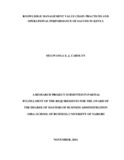| dc.description.abstract | In the present day business environment that is characterized by market changes such as
globalisation, and interconnectivity, business organisations are required to face new
challenges, especially the changing nature of competition coupled with the enhanced
dynamism and complexity of the environment in which they operate. There is need for
the firms to come up with appropriate strategies such as development of internal strategic
capabilities to deal with the uncertainty. Knowledge management (KM) is one such
capability that will create the necessary ability for a firm to gain operational competence.
Through the systematic acquisition, creation, sharing, and use of knowledge,
organisations develop, renew and exploit their knowledge-based resources, thereby
allowing them to be proactive and adaptable to external changes and attain competitive
success. The objective of the study was to establish the role of knowledge management
value chain practices on operational performance of Sacco services in Kenya. The
research adopted a descriptive research design. Data was collected using a selfadministered
questionnaire that was distributed to 28 senior and middle level managers at
the firm that were selected randomly. The findings were that with the adoption of KM by
Saccos, the firm‟s operational performance indicators had changed positively while the
level of customer satisfaction had improved by a high margin. In addition, the level of
customer loyalty and the service turn time had also registered a positive result which was
translated to improved performance measures such as speed of responsiveness, product
availability and higher rate of innovation. The limitation of the study was that it did not
account for certain behavioral factors – related to employees‟ and managers‟
characteristics, attitudes, and experience levels – as well as organizational factors – such
as structure, size, and business nature – that play a moderating role in the relationships
highlighted in this study. | en_US |

